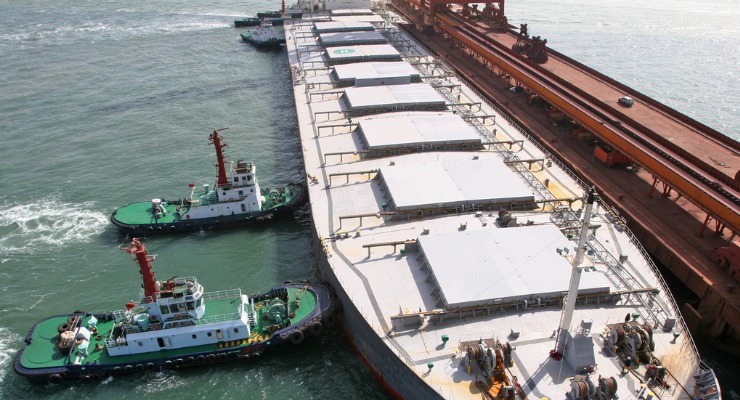
Break bulk shipping and bulk shipping might vary by just one word but in practice they are two completely different types of shipping, so it’s important to understand the difference.
Basically, break bulk shipping is packaged, individual cargo items while bulk shipping is when things like grain are loaded onto the ship loose. The two types of cargo need the right type of ship to match and a terminal that can load and unload that type of cargo.
What is Break Bulk Shipping?
Break bulk shipping refers to cargo that is bundled in bags, drums, boxes, bales and crates that need to be loaded individually. The term’s origins are in the phrase “breaking bulk”. The most common examples of break bulk cargo are manufactured goods and things like cars, machinery and steel.
Break bulk ships were common before the 1960s before the growth in popularity of container shipping. Today around 90% of non-bulk cargo is carried on container ships. Containerisation has reduced shipping time and costs as well as cargo damage and pilfering. But there is still a need for break bulk ships today.
Break bulk ships can be used as intermediary carriers to transport goods to larger ships that can’t enter shallow ports. The ships come in a variety of sizes from 2,000 to 40,000 deadweight tonnage (DWT). The cargo can belong to multiple customers.
What is a Break Bulk Warehouse?
A break bulk warehouse is a warehouse at the dock where break bulk ships are loaded. Typically the break bulk cargo will be delivered by road or rail to the breakbulk warehouse for storage. Once the ship arrives at the dock the goods are taken from the warehouse and loaded aboard the vessel using cranes. Some break bulk vessels have on board cranes, others need to be loaded cranes on the dock.
What is Bulk Shipping?
Bulk shipping refers to goods aren’t packaged but loaded loose onto (or into) the ship. Bulk cargo is usually a commodity i.e. dry, raw goods such as iron ore, grain, and coal etc. Bulk cargo is loaded and unloaded at dedicated bulk cargo terminals. Bulk shipping freight rates are charged per metric tonne depending on the quantity of loaded cargo. The shipping industry measure dry bulk goods by tonnes of deadweight (DWT).
What is Bulk Commodity?
Dry bulk commodities are most commonly raw materials that are used for manufacturing. There are two categories of dry bulk commodities - major bulks and minor bulks. Minerals, ores and grains like wheat & rice are major bulk commodities. Minor bulk commodities include items like manufactured steel products (wire, beams etc.), sugar and cement. All of these bulk commodities are carried by huge dry bulk ships.
Massive Bulk Carriers
Bulk ships can be called ore carriers, bulk carriers and bulkers. The largest bulk carrier ship classification is the Chinamax which can carry an incredible 400,000 DWT. Their length is 360 metres, width 65 metres and draught (between waterline and bottom of the hull) is 24 metres. The sheer size of the Chinamax means they are limited in the number of deepwater ports they can visit. Brazil, China, Europe and the Middle East all have ports that can accommodate the Chinamax. The seven large compartments and loading doors make it easy to load and unload cargo. The growing size of these massive ships has kept the cost of freight down.
Volumes of Break Vs Bulk Shipping in Australia
Australia exported 827 million tonnes to East Asia and 353 million tonnes to Japan/North Asia in 2014/15. The vast majority of Australia’s exports are minerals mainly iron ore, so the majority of freight leaving our shores is bulk shipping. Dampier and Port Hedland in Western Australia are the top two ports with the highest value of sea freight leaving the country for international ports.
Australia’s imports are a small fraction of the weight compared to exports. The bulk of our imports are containerised manufactured goods and vehicles. The freight and logistics industry accounts for 8.6% of Australia’s Gross Domestic Product (GDP).
If you need assistance with sourcing a Chinese manufacturer and shipping to Australia, contact Vara Allied on (08) 6115 0118 or contact us online.